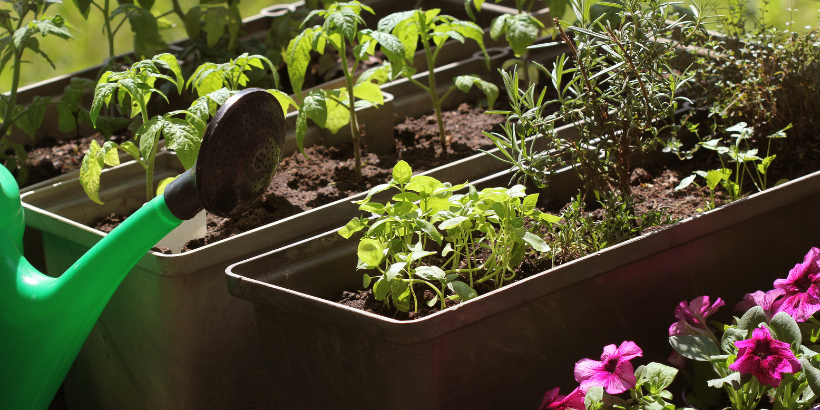Seasonal Gardening Tips: What to Plant and When for Ideal Outcomes
Opening the Advantages of Horticulture: A Detailed Check Out the Different Types and Their Effect On Wellness
Checking out the complex benefits of horticulture reveals a range of methods that considerably boost specific wellness. From vegetable and herb yards to container and elevated bed arrangements, each kind uses unique advantages that expand past mere cultivation. These activities not just foster physical wellness with active interaction but also add to mental health by minimizing stress and encouraging mindfulness. As we examine these diverse gardening methods, it comes to be obvious that their influence can reverberate on personal, social, and environmental levels, prompting a closer consider exactly how these connections create a cohesive narrative of holistic wellness.
Sorts Of Horticulture

Flower horticulture, an additional prominent classification, emphasizes the visual allure of cultivated blossoms. This kind can improve landscapes and promote biodiversity by attracting useful pollinators. Likewise, herb horticulture includes growing fragrant and culinary plants, adding both to food preparation and natural solutions.
Container gardening offers flexibility, enabling people with restricted room to take part in horticulture by utilizing pots and planters. This approach is especially popular in metropolitan setups. Elevated bed gardening, on the various other hand, involves producing elevated stories that improve dirt water drainage and access, making it much easier for gardeners to manage their plants.
Last but not least, neighborhood horticulture fosters partnership amongst individuals in common rooms, promoting social communication and collective responsibility. Each kind of horticulture offers distinctive purposes and satisfies various preferences, making horticulture a versatile activity that can be customized to specific requirements and settings.
Mental Health Advantages
Participating in numerous sorts of gardening not just produces concrete incentives such as fresh fruit and vegetables and gorgeous blossoms but also supplies considerable mental health and wellness benefits. Study suggests that horticulture can be an effective tool for lowering stress, stress and anxiety, and anxiety. The act of often tending to plants and growing a yard fosters a sense of purpose and accomplishment, which can improve general psychological wellness.
In addition, horticulture urges mindfulness, as it requires individuals to concentrate on the here and now moment, whether it be planting seeds or nurturing growth. This mindfulness method can cause minimized rumination and boosted mood stability. The exposure to native environments during gardening has also been linked to boosted cognitive working and decreased feelings of tiredness.
Social communication plays a crucial role in psychological wellness, and area horticulture initiatives provide possibilities for people to attach with others, cultivating a feeling of belonging. The common experience of horticulture can cultivate friendships and assistance networks, additionally boosting emotional resilience.
Physical Wellness Conveniences
Lots of people may not understand that horticulture also offers significant physical health and wellness benefits. Taking part in gardening tasks calls for a variety of physical activities, including flexing, training, digging, and planting, which jointly add to improved stamina, adaptability, and endurance. These actions can improve cardio health and wellness by advertising an elevated heart rate, consequently reducing the danger of heart condition.
Furthermore, horticulture can work as a moderate-intensity workout, aiding individuals achieve suggested exercise degrees. Researches indicate that regular involvement in horticulture can melt significant calories-- roughly 200-400 calories per hour, depending upon the strength of the jobs executed. Such calorie expense is advantageous for weight administration and total metabolic wellness.
Additionally, exposure to sunlight throughout horticulture can facilitate the synthesis of vitamin D, which plays an essential function in preserving bone health and wellness and sustaining immune feature. In addition, the act of pop over here horticulture often involves collaborating with soil, which has been linked to potential mental and physical health advantages as a result of the visibility of valuable microbes. Gardening.
Social Links With Gardening
The common elements of gardening foster meaningful social links amongst people. Neighborhood gardens, particularly, act as vibrant centers where individuals from varied backgrounds come together, growing not just plants however also connections. These shared rooms motivate collaboration, permitting people to exchange knowledge, abilities, and sources, consequently improving their gardening experience and cultivating a sense of belonging.
Engagement in horticulture activities commonly causes the formation of relationships and support networks. Individuals often unite for typical goals, such as growing seasons, harvest parties, or academic workshops, which strengthen social ties and develop a sense of area. Such interactions can alleviate sensations of isolation and boost psychological well-being, as people find friendship and camaraderie in common endeavors.

Ecological Impact of Horticulture
Horticulture considerably contributes to environmental sustainability in numerous means. One of the most significant benefits is the improvement of biodiversity. Home gardens supply important environments for numerous species, including pollinators such as bees and butterflies, which are necessary for ecosystem health and wellness. By growing varied plant types, gardeners can create a well balanced setting that sustains both flora and fauna.

Additionally, gardens play a crucial role in water preservation. Well-planned landscapes, including indigenous plants and xeriscaping, minimize water usage and protect against drainage, thus protecting neighborhood rivers from pollution.
Final Thought

Finally, gardening acts as a diverse task that enhances health across different domain names. The diverse sorts of horticulture-- including veggie, blossom, herb, container, and hop over to these guys elevated bed-- add to mental and physical wellness, foster social connections, and advertise environmental sustainability. By taking part in horticulture practices, people can experience improved lifestyle while also supporting area bonds and environmental wellness. Ultimately, the alternative advantages of horticulture underscore its value as an important component in boosting overall well-being.